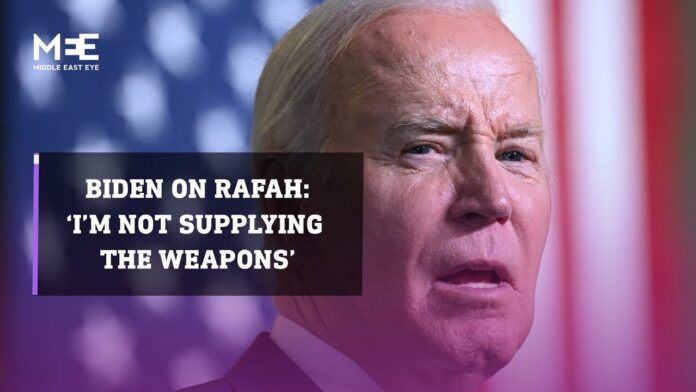US signals potential pause on arms shipments amid Israeli military plans for Rafah offensive, highlighting diplomatic pivot and rising pressure
President Joe Biden’s recent statement regarding US arms supplies to Israel signals a pivotal moment in US-Israel relations amid the ongoing conflict in Gaza. The Biden administration explicitly warned that it would halt the provision of offensive weapons if Israel proceeds with a ground invasion of Rafah, the last Hamas stronghold in Gaza. The president’s comments followed earlier actions to pause a shipment of high payload munitions, representing the most significant rebuke of Israel’s actions since the October 7 Hamas attack that prompted Israel’s military response.
This caution has underscored mounting international and domestic pressure, particularly from progressive Democrats, to ensure civilian lives are safeguarded in the densely populated urban landscape of Rafah. While Biden affirmed unwavering support for Israel’s right to defend itself, he expressed concern over the potential humanitarian consequences of a ground invasion. US defence officials like Secretary Lloyd Austin reinforced Biden’s warning, clarifying the pause on weapon shipments as a policy decision due to the Rafah offensive’s potential impact on civilians. This stance has generated mixed reactions among Israeli officials, with some expressing disappointment while others downplay the significance of the shipment delays. Meanwhile, the global community continues to scrutinize the unfolding conflict, as diplomatic talks between Israel, Hamas, and international mediators attempt to secure a ceasefire.
The Guardian
A Guardian article detailed the potential diplomatic rift between the US and Israel following Biden’s unprecedented move to halt weapons shipments. Defense Secretary Lloyd Austin publicly confirmed the shipment of thousands of large bombs had been paused, signalling the US’s growing unease with Israel’s military plans. Israeli Ambassador to the UN Gilad Erdan expressed disappointment over the delay, labelling it frustrating and counterproductive to Biden’s stated aim of supporting Israel’s goal to neutralize Hamas.
The Guardian’s analysis emphasizes the hold on arms as an intentional and significant policy pivot. Anonymous US officials conveyed this move as a ‘shot across the bow,’ demonstrating serious US concerns over the Rafah offensive. Moreover, the article pointed out international unease about the destructive potential of American-supplied munitions in urban environments. The Biden administration deliberately chose not to label this a ‘red line,’ though conversations continue between US and Israeli officials over aligning the latter’s military actions with international standards.
BBC
According to a *BBC* report, President Biden’s CNN interview solidified his strongest warning yet against a potential ground invasion of Rafah. Despite vocal opposition from the US government, Israel appeared poised to proceed, with the densely populated city presenting a strategic and humanitarian challenge. The shipment delay involved some of the most destructive munitions available, though Israel minimized the impact, suggesting any rifts would be resolved privately. Biden’s acknowledgement of US weapons being used to kill civilians in Gaza marked a rare moment of direct critique of Israel’s conduct, further highlighting the gravity of the situation.
Domestically, Biden faces mounting pressure from progressives urging restraint in aiding Israel’s military campaign. The report included reactions from Israel’s Likud party and Daniel Hagari, a military spokesman, who sought to downplay the halt as a temporary dispute.
Times of Israel
The Times of Israel emphasized reactions to Biden’s comments, capturing the backlash from Israeli officials and pro-Israel Americans. The article highlighted Erdan’s ‘disappointment’ in Biden’s remarks, which has led to hesitancy among Jewish voters toward Democrats. Furthermore, the live blog provided insights into ongoing military developments, including concerns from Iran about its nuclear program, Netanyahu’s challenges, and regional tensions with Syria.
The blog noted Lapid’s criticism of Netanyahu’s management of US-Israel relations, while officials called for the resolution of disputes privately to maintain the historically strong alliance.
Financial Times
The Financial Times underscored Biden’s message as a stark warning to Netanyahu, highlighting the historic nature of holding back offensive weapons over humanitarian concerns. Washington initially paused a shipment of high payload bombs after discussions with Israel left the US dissatisfied with assurances on Rafah operations. Biden’s warning illustrated growing international scrutiny of US-supplied munitions in urban settings, with the Pentagon pausing the shipment of thousands of 2,000-pound bombs. The article explored the context of such weapons’ use and the ramifications on the Israel-Hamas conflict.
The FT also noted internal reviews of JDAM kits, which enhance bomb accuracy, reflecting ongoing scrutiny of weapon supply cases amid heightened conflict concerns

